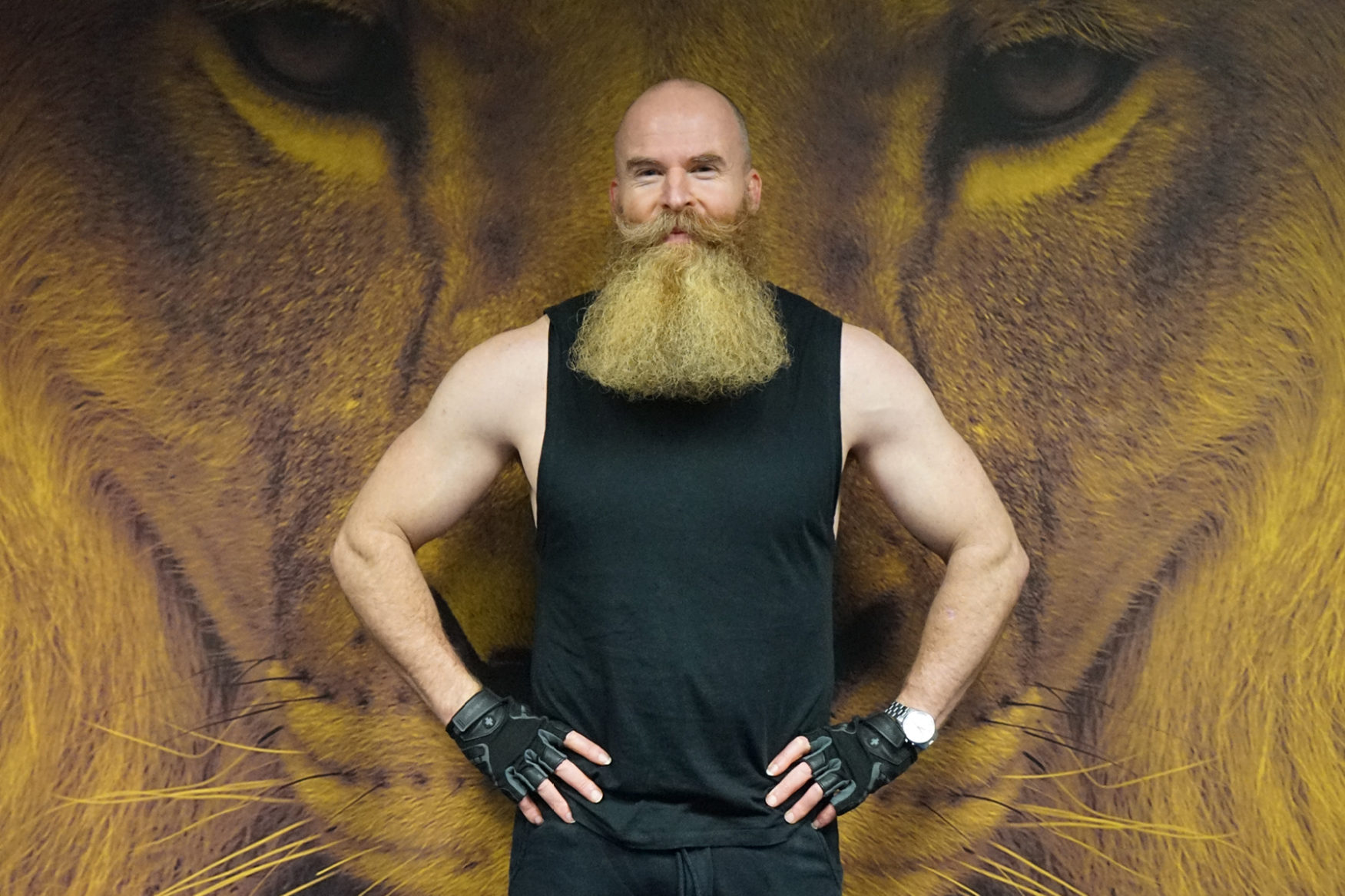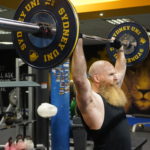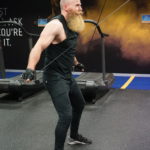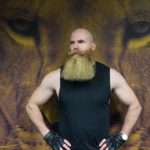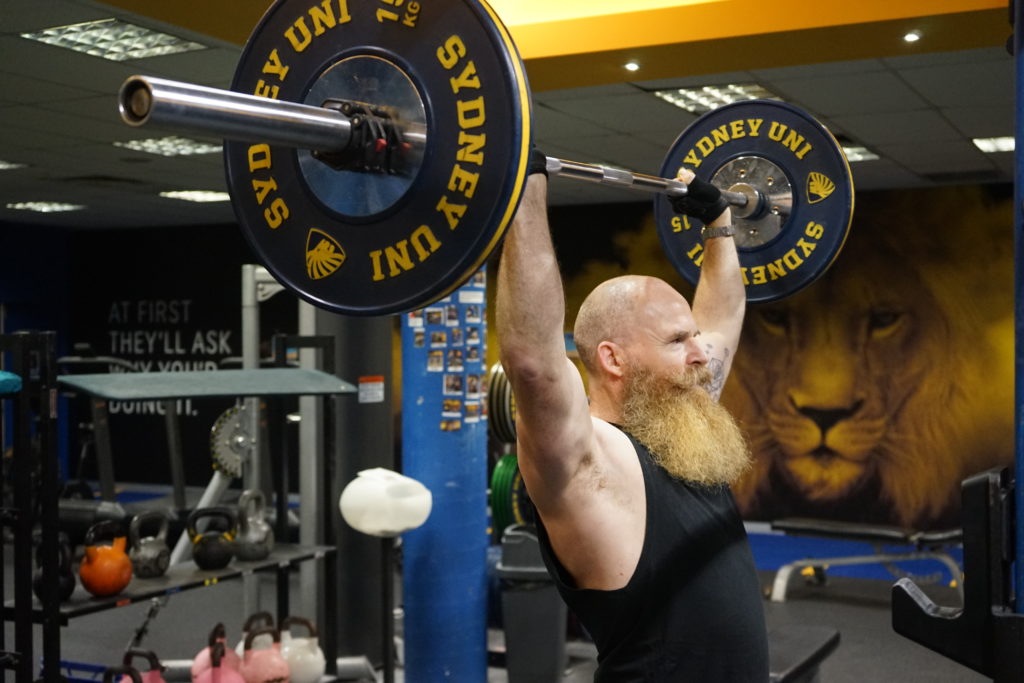Sydney University Professor Chris Smith is a long-standing member of Sydney Uni Sport & Fitness (SUSF). On most days, you’ll catch him lifting tin around 4:30pm at the Sports & Aquatic Centre and although Chris’ beard and lifting ability aren’t hard to miss, what stands out most about him is his perspective on work and training. It’s both interesting and refreshing. Have a read for yourself.
Let’s start with some icebreakers. If you were a wrestler, what would be your entrance theme song?
I’d like it to be Fleetwood Mac’s ‘Tusk’ but, in reality, it’s probably Mancini’s ‘Baby Elephant Walk’.
Are you a traveller or a homebody?
Homebody. I live in Erskineville, and I rarely go any further east than the University and any further west than Enmore. In the pre-pandemic era, I would go south as far as the airport so that I could spend time in other countries versions of the ‘Inner West’.
Best book you’ve ever read?
For a long time, it was a toss-up between Virginia Woolf’s Mrs Dalloway (1925), Steppenwolf (1927) by Hermann Hesse, and Primo Levi’s The Wrench (1978), but some years ago, friend introduced me to the Czech writer, Bohumil Hrabal and his brilliant novel Too Loud a Solitude (1989) came to be the best book I’ve ever read. It’s a touching story of a consuming love of books and a warning to anyone who collects too much of anything.
How long have you been a member of SUSF?
I’ve been a member for about 5 years now which, by my calculation, is about 280,000 reps.
How would you describe what it’s like to train at SUSF?
The gym at the Sports & Aquatic Centre is upbeat, energised, and supportive. There’s a mass diversity of people: all ages, all types of bodies and bodily capacities, all nationalities, and the full sliding spectrum of sexualities and genders. It’s a respectful gym and the trainers are incredibly skilled! Best of all, it’s the only gym in Australia where you can pump iron whilst watching ‘ABC News’ and ‘Antiques Roadshow’.
You’re a Professor of Architectural Theory at The University of Sydney. What inspired this career path, and how long have you been doing it for?
I started my academic life in the North of England almost 20 years ago. I completed a PhD focusing on the complex relation between buildings and bodies, and ever since, I’ve been working on the intimate connection between who we are and where we are.
I think that there’s a constant shaping and reshaping of ourselves and our society that goes on – a type of constant renovation that is happening between ourselves and our ecologies. A key part of these ecologies is our cities and buildings. Our buildings house, harbour, hold, and mould us. This is to say, our buildings and our cities construct us as much as we construct them.
Thus, so much of my day is all about bodies and buildings. And bodybuilding. The very idea that you can change or construct a body – sits neatly amongst this set of ideas.
Is having your gym on the same campus you work at something you enjoy?
The gym sits between where I work and where I live, making it a very comfortable fit. I could likely call into the gym at any time of the day, but I don’t. Instead, I have a pretty well-regulated pattern through the week. I arrive at work early, work hard, and then head to the gym at about 4pm. I think the gym allows me to spend time dealing with my body (and mind) before I roll home. It’s a sort of inter-world where I can slowly achieve small goals and let thoughts settle.
Gym staff tell us you’ve been nicknamed the Deadlift King. Can you tell us a little bit more about that?
That’s very kind but a mild exaggeration. I love deadlifting though – it’s an exercise that uses almost every muscle in your body, and it also involves serious concentration. I’m doing well for a pescatarian in their late 40’s, but not quite at the level of deadlift royalty. I started deadlifting because I’d watched a documentary about Eddie Hall, the professional strongman. When Eddie was about half my age and weighed about 160kg he managed to deadlift an incredible 500kg. For my part, I can deadlift 180kg (for 8 reps). What this means is that whilst I cannot lift anywhere near what Eddie lifts, I could comfortably lift Eddie himself (as long as he laid flat and didn’t wriggle).
Exercise is known to have many positive benefits when it comes to our health and well-being. What do you love most about it?
I think I look like an extra from the set of a Viking movie, or an aging Hells Angel in the gym but what I’m actually doing is meditating. Using weights involves a lot of repetitious counting: 8 reps x 3 sets x 8 different exercises, over and over again, 5 or 6 days a week, and about 48 weeks a year. The repetition becomes something of a chant. It has been as good for my brain as it has for my biceps.
Outside of teaching and training, what do you like to do in your spare time?
I’m a huge fan of Nordic Noir. I enjoy nothing more on a Friday evening than a couch, a gin and tonic, and a horrific murder somewhere in a village in Denmark.
I need to ask about your beard. How long have you been growing it for, and does it take a lot of work to maintain?
I’d been in a previous rocky relationship with head-hair, and when I first met my beard I was on the rebound. That was about 3 years ago now, and we’ve been really happy together.
In some ways, a beard is low maintenance. I save a lot of time in terms of the effort I previously put into shaving or trying to keep the ‘stubble’ at the right length. On the other hand, like every relationship, you have to put in the effort. I brush it twice a day, and I give it a thorough shampoo once a week. And because I’m not a selfish lover, I also massage cocoa butter into it after we shower to keep it toned (and smelling a little like a hairy Ferrero Rocher).
Is there anything else you’d like to tell us about your time at SUSF?
When I started going to the gym, I was worried about how I looked and whether people were looking at me. In reality, the vast majority of people are focused on themselves. Not in a particularly vain way, rather people are at the gym because they are all dealing with things that they’d like to alter. Most people are there to alter the decline of capacities, to build capacities, to change shapes, to alter shapes. And this isn’t a narcissistic or a selfish thing. I think it’s actually about taking power over who you are by choosing to be there… by choosing the gym as where you are.
